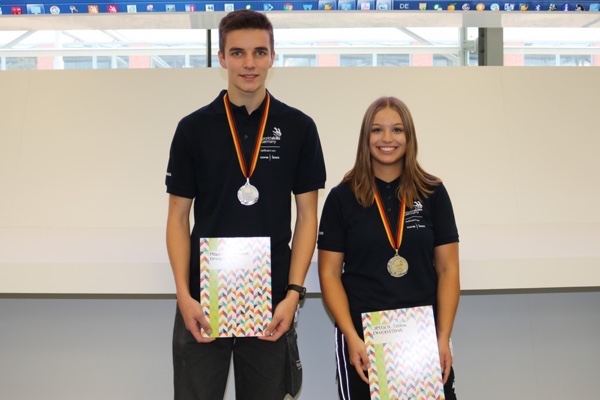Offset Printing
Best young media professionals honored at WorldSkills Germany

Wednesday 07. November 2018 - This years WorldSkills Germany competition saw a total of fifteen highly motivated and committed young media professionals taking part. For the first time, the German championships in print media technology, graphic design, and web design took place centrally from 23 to 25 October 2018 in the Print Media Center of Heidelberger Druckmaschinen AG in Wiesloch-Walldorf.
The gold medal in the printing technology skill went to Jessica Sturm from Druckerei Raichle in Marktoberndorf, with the silver going to Maurice Vornholt from Mohn Media in Gütersloh. In the graphic design skill, gold went to Klara Schäffer, Heilbronner Stimme, Heilbronn, silver to Tim Kreische, unitedprint.com SE, Radebeul, and bronze to Anton Chertkov, Die Etagen GmbH, Osnabrück. In the web design skill, Dominique Oppermann, P3 Medienagentur der MMBbs, Hanover, took home gold, with Mona Lange, Beckdesign, Bochum and Antonio Groß, aquafun, Mönchengladbach taking home silver and bronze respectively.
All winners were presented with their medals and certificates by Franz Schropp, Senior Technical Delegate from WorldSkills Germany, Anette Jacob from Zentral-Fachausschuss Berufsbildung Druck und Medien (ZFA, Central Committee for Vocational Training in Print and Media), and Professor Dr. Ulrich Hermann, Member of the Management Board responsible for Life Cycle Solutions and Chief Digital Officer at Heidelberg. The medal-winning participants form the respective national team in their skill and will now receive intensive training for the international competitions from the experts. One of them will represent Germany at WorldSkills in Kazan in Russia in August 2019.
The award ceremony was incorporated into Campus Day, an event hosted by Heidelberg for vocational students. Over 130 budding young talents applauded enthusiastically and got an impression of what the competition involves. “The digital age offers great opportunities for committed and qualified young professionals and is, as it were, a prerequisite for the digital transformation of the leading industrial companies in their respective fields,” confirmed Prof. Dr. Ulrich Hermann.
Clever and creative minds are in demand
Participants in WorldSkills Germany must have completed their training and be under 23 years of age. Applications are submitted to Zentral-Fachausschuss Berufsbildung Druck und Medien (ZFA). The participants can look forward to varied, exciting, and eventful competition tasks based on the tasks of the international WorldSkills. For example, those competing in the printing technology skill had to print two posters, mix two spot colors, and complete one maintenance task. The graphic designers created a logo, a flyer, posters, and a packaging. The competitors in the web design skill demonstrated basic web design concepts with server- and client-side programming and design. An expert jury made up of representatives of the vocational school teachers, the association, the German Chamber of Industry and Commerce, and the ZFA evaluated the work on each day of the competition and then determined the winners.
The German championships are hosted by WorldSkills Germany together with partners such as Bundesverband Druck und Medien e.V. (the German printing and media industries federation), SRH Berufsbildungswerk Neckargemünd (a non-profit vocational training organization), and Zentral-Fachausschuss Berufsbildung Druck und Medien (the central committee for vocational education and training in print and media). “We are proud to be a founding member of WorldSkills Germany and to be supporting the national championship for the eighth time. And this time as a platform for all media professions,” said Prof. Dr. Hermann at the award ceremony. “The media professions are in great demand in the industry, which is looking for the clever and creative minds of the future.” Heidelbergs clear commitment to training was honored in spring with its nomination as a Federal Performance Center for Printing. All computer equipment for the graphic design and web design skills was provided by SRH.
Heidelberg a forerunner in the digitalization of vocational training
For five years, Heidelberg has been one of the five partners which supports the “Social Augmented Reality” and “Social Virtual Learning” project in technical and commercial vocational training funded by the Federal Ministry of Education and Research. The project is coordinated by ZFA (Social-augmented-learning). Heidelberg contributes the 3D press data so that the students can master learning modules such as lateral ink distribution, sheet reversal, or inline coating in virtual space using a model of the Speedmaster SX 74. The opportunities afforded by visualization and knowledge management have already yielded very good results at vocational schools. Throughout Germany, nine institutions are already equipped with AR/VR technology, and Switzerland, Austria, and Denmark want to follow suit. There are also learning modules with the high-speed cutter from Polar, and the current project uses label printing machines from Gallus for flexo and digital printing. The project has been extended until 2020.
Heidelberg also uses AR/VR in its own training. There are five places per training year, divided into three for print media technologists and one each for packaging technologists and digital and print media designers. In addition, the company provides mechatronics engineers with targeted training in using the View2Connect virtual collaboration and communication platform, which facilitates completely digital assembly planning among other features. Virtual Reality is an integral part of the technical training here. For example, as part of Heidelbergs Future Workshop, trainees in the “Digital Platforms” area are working on a project to produce and jointly develop 3D printing systems on behalf of Karlsruhe-based start-up Apium with support from View2Connect.
